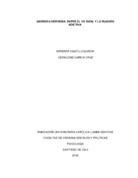Mostrar el registro sencillo del ítem
Anorexia nerviosa: entre el yo ideal y la fijación adictiva
| dc.contributor.advisor | Benavidez, Malcón | |
| dc.creator | Castillo Garcia, Barbará | |
| dc.creator | García Cruz, Geraldine | |
| dc.date.accessioned | 2020-05-08T23:32:10Z | |
| dc.date.available | 2020-05-08T23:32:10Z | |
| dc.date.created | 2019 | |
| dc.identifier.uri | http://hdl.handle.net/20.500.12237/1818 | |
| dc.description | En esta monografía se reconoce el papel fundamental que juega los antecedentes biológicos, el entorno social, la familia y los pares en el desarrollo de la Anorexia Nerviosa, como también las acciones que ejecutan los sistemas de salud en el proceso de recuperación de los pacientes. Por esta razón es importante realizar una integración interdisciplinar entre los profesionales del campo de la salud, especialmente de la Salud mental. “La Anorexia Nerviosa: Entre el yo ideal y la fijación adictiva”, propone una mirada diferencial en la comprensión y posteriormente abordaje de la Anorexia nerviosa, como una patología caracterizada por la dificultad de contactar con las necesidades reales de quien la padece. Así mismo es una patología de conductas adictivas en relación al cumplimiento de un ideal, el cual está distorsionado y permeado por el entorno, quien finalmente demanda sobre el comportamiento de dichos pacientes. En la sociedad actual, los jóvenes crecen bajo ideales estéticos, que previamente la industria, la televisión, las revistas de moda y el internet ha creado, se vive bajo la opresión de la báscula, aquellos números representan el todo de quien los ve. Una cultura en la que las medidas corporales y el peso representan el valor personal que tiene cada individuo. La báscula se convirtió en un mecanismo de control importante y las dietas son su mejor aliado. Este panorama aunque parezca abrumador, es la realidad de millones de personas en el mundo. Los trastornos de alimentación se comprenden en un panorama que está asociado a la imagen corporal al igual que a los ideales estéticos. La errónea interpretación de que la delgadez es sinónimo de éxito, ha llevado a que mucha personas en el mundo lastimen su cuerpo y su mente, intentando responder eso paramentos sociales ya establecidos. Cabe aclarar que esta elección no solo proviene de lo que la cultura propone, el entorno en donde se desarrolle la persona y las redes de apoyo que forje también influencian sobre padecer o no un trastorno de alimentación. El panorama que actualmente tiene la anorexia es alarmante, cada vez más niños, niñas y a adolescentes están muriendo a causa de este trastorno, lo que lo ubica como un problema de salud pública, que requiere de inmediata atención. Pues, el sufrimiento de estas personas es innegable, la magnitud del dolor psicológico lleva a que los pacientes opten por quitarse la vida. Entonces, parece trascendental pensar en el sistema de Salud que atiende a estas personas, ¿cuál y cómo es el tipo de atención que se requiere para los trastornos de alimentación?, en este caso la Anorexia Nerviosa. Por tal razón, en este proyecto de investigación se plantea un modelo de atención basado en la humanización y empoderamiento de los pacientes sobre su condición. Es decir, que esta propuesta con fundamentación teórica humanista, busca generar una atención holística que de paso a una óptima recuperación en cada paciente. Así mismo permite que los pacientes comprendan lo que les sucede, reconozcan la responsabilidad que tienen sobre si mismos para lograr un cambio y por ultimo creen herramientas para enfrentarse al mundo. | spa |
| dc.description.abstract | In this monograph, the fundamental role played by biological background, social environment, family and peers in the development of Nervous Anorexia is recognized, as well as the actions that health systems carry out in the process of recovering patients. For this reason it is important to carry out an interdisciplinary integration among professionals in the field of health, especially mental health. “Nervous Anorexia: Between the ideal self and addictive fixation”, is a research proposal made by Barbará Castillo and Geraldine García, students of Psychology, along with the indispensable guidance of tutor Macoln Benavidez. Which proposes a differential view in the understanding and later approach of Anorexia nervosa, as a pathology characterized by the difficulty of contacting the real needs of the sufferer. He himself is a pathology of addictive behaviors in relation to the fulfillment of an ideal, which is distorted and permeated by the environment, who finally demands on the behavior of these patients. In today's society, young people grow under aesthetic ideals, which previously the industry, television, fashion magazines and the Internet has created. You live under the oppression of the scale, those numbers represent the whole of those who see them. A culture in which body measurements and weight represent the personal value of each individual. The scale became an exaggeratedly important control mechanism and diets are your best ally. This panorama, although it seems overwhelming, is the reality of millions of people in the world. Eating disorders are understood in a scenario that is associated with body image as well as aesthetic ideals. The misunderstanding that thinness is synonymous with success has led many people in the world to hurt their body and mind, trying to respond to these established social backgrounds. It should be clarified that this choice not only comes from what the culture proposes, the environment in which the person develops and the support networks that he forges also, influence whether or not to suffer an eating disorder. The panorama that anorexia currently has is alarming, more and more children and adolescents are dying from this disorder, which places it as a public health problem, which requires immediate attention. Well, the suffering of these people is undeniable, the magnitude of psychological pain leads to patients choosing to take their lives. So, it seems transcendental to think about the health system that serves these people, which one and how? It is the type of care that is required for eating disorders, in this case Anorexia Nerviosa. For this reason, this research project proposes a model of care based on the humanization and empowerment of patients about their condition. That is, this proposal with a theoretical humanistic foundation, seeks to generate a holistic attention that leads to an optimal recovery in each patient. It also allows patients to understand what happens to them, recognize the responsibility they have for themselves to achieve change and finally create tools to face the world. | spa |
| dc.format.mimetype | application/pdf | spa |
| dc.subject | Anorexia nerviosa | spa |
| dc.subject | Psicología humanista | spa |
| dc.subject | Homeostasis | spa |
| dc.title | Anorexia nerviosa: entre el yo ideal y la fijación adictiva | spa |
| dc.subject.subjectenglish | Nervous anorexia | spa |
| dc.subject.subjectenglish | Humanistic psychology | spa |
| dc.subject.subjectenglish | Homeostasis | spa |
| dc.rights.accessRights | info:eu-repo/semantics/openAccess | spa |
| dc.creator.degree | Psicólogo | spa |
Ficheros en el ítem
Este ítem aparece en la(s) siguiente(s) colección(ones)
-
Psicología [203]

